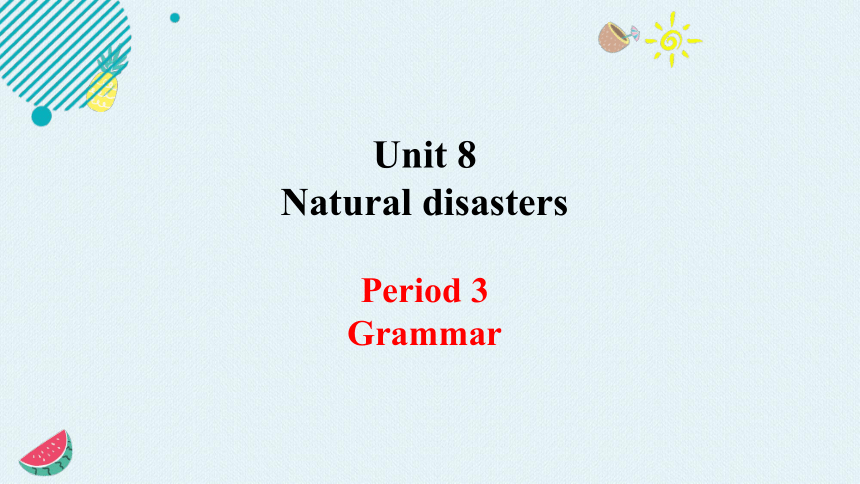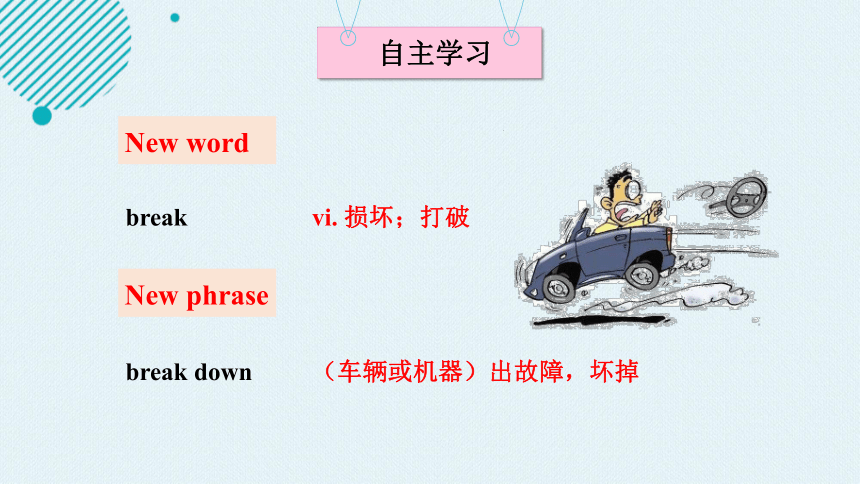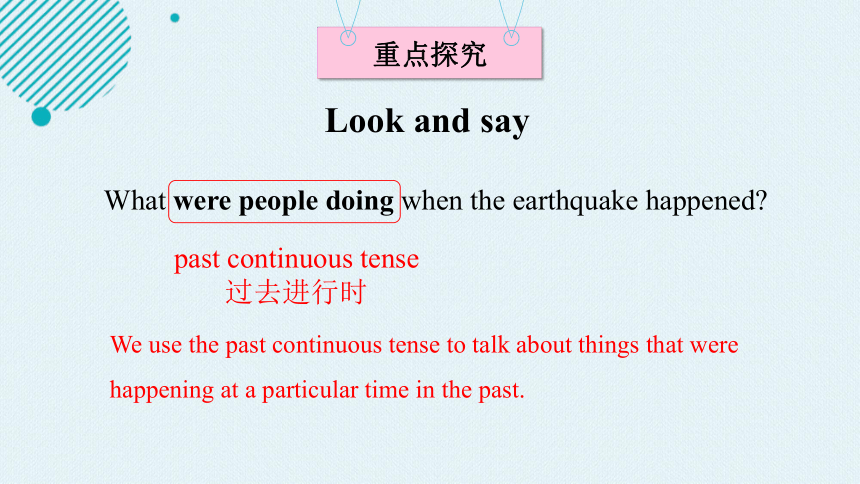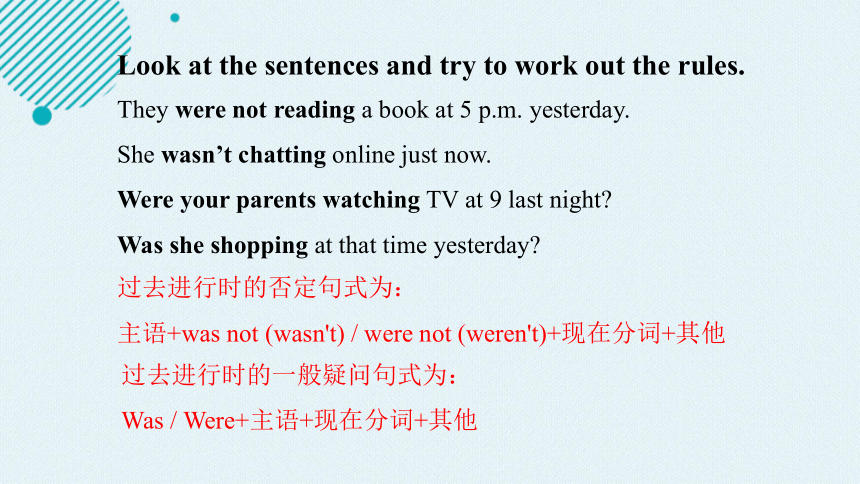Unit 8 Natural disasters Period 3 Grammar课件(共29张PPT) 牛津译林版八年级上册
文档属性
| 名称 | Unit 8 Natural disasters Period 3 Grammar课件(共29张PPT) 牛津译林版八年级上册 |

|
|
| 格式 | pptx | ||
| 文件大小 | 3.6MB | ||
| 资源类型 | 教案 | ||
| 版本资源 | 牛津译林版 | ||
| 科目 | 英语 | ||
| 更新时间 | 2024-08-06 00:00:00 | ||
图片预览









文档简介
(共29张PPT)
Unit 8
Natural disasters
Period 3
Grammar
1.学习目标
3.重点探究
2.自主学习
学习导航
5.当堂检测
6.课堂总结
4.拓展提升
新课导入
Enjoy the music
I was dancing with my darling
To the Tennessee waltz
When an old friend I happened to see
Introduced her to my loved one
And while they were dancing
My friend stole my sweetheart from me
I remember the night and the Tennessee waltz
Now I know just how much I have lost
Yes I lost my little darling
The night they were playing
The beautiful Tennessee waltz
1.能熟悉并正确运用本课时的重点单词和短语。
2.能掌握过去进行时。
3.能掌握when、while和as的用法。
学习目标
自主学习
New word
vi. 损坏;打破
break
New phrase
(车辆或机器)出故障,坏掉
break down
重点探究
What were people doing when the earthquake happened
Look and say
past continuous tense
过去进行时
We use the past continuous tense to talk about things that were happening at a particular time in the past.
He was watching TV at nine yesterday.
We were sleeping when you came.
She was cooking dinner at that time.
They were playing football that afternoon.
You were reading when the telephone rang.
I was washing my car at this time yesterday.
And you know, it was raining hard at the time
Look at the sentences and try to work out the rules.
We use “was + doing” with the pronoun _____, _____, _____ and _____.
We use “were + doing” with the pronoun _____, _____ and _____.
he she it I
you they we
过去进行时的肯定句式为:
1.
2.
主语 + was / were +现在分词+其他
Look at the sentences and try to work out the rules.
They were not reading a book at 5 p.m. yesterday.
She wasn’t chatting online just now.
Were your parents watching TV at 9 last night
Was she shopping at that time yesterday
过去进行时的否定句式为:
主语+was not (wasn't) / were not (weren't)+现在分词+其他
过去进行时的一般疑问句式为:
Was / Were+主语+现在分词+其他
Look at the sentences and try to work out the rules.
Was she talking at that time
Yes, she was.
Were they teaching English
No, they weren't.
过去进行时的一般疑问句回答:
肯定回答:Yes, 主语+was/were.
否定回答:No, 主语+wasn't/weren't.
A snowstorm hit Sunshine Town. Mr Wu is asking the students about plete their conversation with the correct forms of the verbs in brackets.
Mr Wu: What a terrible snowstorm! It started at about seven this
morning. I ___________ (read) the newspaper then.
What _____ you ______ (do), Simon
Simon: I ___________ (have) breakfast.
Mr Wu: What about you, Millie
was reading
were doing
was having
Millie: I ____________ (walk) to the bus stop. Sandy, I saw
you and your parents standing on the side of the road.
_____ you _______ (wait) for a taxi
Sandy: Yes. My dad’s car broke down because of the cold
weather. He ___________ (ring) someone to come and
help when you saw me.
was walking
Were
waiting
was ringing
Look at the sentences and try to work out the rule.
I was sleeping when the earthquake started.
People were running in all directions while pieces of glass and bricks were falling down.
As I was trying to find my way out, I suddenly heard some noise above me.
When, while and as can be used as conjunctions of time. They all mean “during the time that”.
When/While/As Millie was watching TV, Andy came into the sitting-room.
______________
longer action
________
shorter action
Look at the sentences and try to work out the rules.
When a shorter action happened at the same time as a longer action, we use the past continuous tense for the longer action and the simple past tense for the shorter action.
If the shorter action is in the main clause, we can use when, while or as to join them.
1.
2.
While Millie was watching TV, Eddie was sleeping.
___________
longer action
______________
longer action
When there are two long actions, we often use “while”.
Look at the sentences and try to work out the rules.
Millie was watching TV when Andy came into the sitting-room.
______________
longer action
If the longer action is in the main clause, we often use “when” to join them.
Some Class 1, Grade 8 students went to play in the plete the sentences with the correct forms of the verbs in brackets. Use when, while and as to connect the sentences.
_______________ Simon _________________ (arrive), Amy _______________ (get) some snow from the ground.
_______________ Suzy and Kitty _______________ (build) a snowman, Millie _________________ (take) photos.
When
arrived
While/When/As
was building
was taking
was getting
Daniel _______________ (fall) over __________________ he _________________ (make) a big snowball.
Peter _________________ (hide) behind a tree _______________ a snowball ________________ (hit) him.
_______________ Millie and her classmates _____________ (play) in the snow, Andy _________________ (run) towards them.
fell
while/as/when
was making
was hiding
when
hit
were playing
When/While/As
ran
拓展提升
1. My dad's car broke down because of the cold weather.
break down (车辆或机器)出故障,坏掉
e.g. The car broke down on the way to the airport.
车子在去机场的路上出故障了。
Language Points
because of 因为;由于
e.g. Because of you, we have to put the meeting off.
因为你的缘故,我们已把会议推迟了。
过去进行时
我们可以用过去进行时表示过去某一时刻正在进行的动作或过去某一阶段一直在进行的动作。如:
I was doing my homework at 8 p.m. last night.
昨晚8点我正在做家庭作业。
What were you doing last month
你上个月一直在做什么?
过去进行时的肯定结构是由“was/were + 现在分词”构成,否定 结构是由“was/were + not + 现在分词”构成。如:
The boy was cleaning the house. 那个男孩在打扫房子。
We were not shopping at this time yesterday.
昨天这个时候我们没在购物。
有些动词通常不用于进行时,主要有:
1. 表示心理状态、情感的动词,如love、hate、like、know等。
2. 部分连系动词,如seem、appear等。
3. 感官动词,如see、hear、feel、smell、sound、taste等。
4. 短暂性动词,如decide、stop等。
when、while和as的用法
when,while和as这三个词均有“当……时候”的意思。
There were fewer sandstorms when my grandparents were young.
我祖父母年轻时沙尘暴要少些。
While Millie was watching TV, her mum was sleeping.
米莉在看电视时她妈妈在睡觉。
I saw a traffic accident as I was riding to school this school.
今天早晨我骑车上学时看见一起交通事故。
when和as既可以指某一点时间,也可以指某一段时间,其从句谓语动词表示的动作既可以是瞬间性的,也可以是延续性的;while指一段时间,从句的谓语动词必须是延续性的。即:指一段时间时,when、while和as都可用;指一点时间时,只能用when或as,不能用while。试比较:
When/As he woke up, it was eight o'clock. ( √ )
While he woke up, it was eight o'clock. (×)
When/While/As I was waiting for a bus, I met her. ( √)
when引导的从句的谓语动作可以在主句谓语动作之前、之后或同时发生;while和as引导的从句的谓语动作必须是和主句谓语动作同时发生。
When he finished his homework, he played the computer games for a
while. 当他完成作业后,他玩了会儿电脑游戏。(finished先发生)
When I got to the museum, the door was closed.
当我赶到博物馆时,大门已经关上了。(got to后发生)
While/As I was sleeping, the telephone rang.
当我睡觉时,电话响了。(was sleeping和rang同时发生)
当主句、从句动作同时发生且从句动作为延续性动词时,when、while和as都可使用。
When/While/As she was making a phone call, I was writing an email.
当她在打电话时,我正在写一封电子邮件。(make为延续性动词)
When/While/As we were reading, a stranger came in.
当我们正在看书时,一位陌生人走了进来。(read为延续性动词)
强调两个动作同时进行,常用“过去进行时+while+过去进行时”结构。如:
They were rowing boats while we were climbing the hill.
当我们在爬山时,他们在划船。
强调某个动作发生的时候,另一个动作正在进行,常用“一般过去时+while+过去进行时”结构如:
It began to rain heavily while we were having dinner.
我们在吃完饭时,开始下起大雨。
强调某个动作正在进行时,另一个动作突然发生,常用“过去进行时+when+一般过去时”结构。如:
I was walking in the street when he called me.
我正在街上走时,他突然喊我。
当主句、从句动作同时进行,从句动作的时间概念淡化,而主要表示主句动作发生的背景或条件时,只能用as。这时,as有“随着……”;“一边……,一边……”之意。
As years go by, China is getting richer and stronger.
随着时间一年一年过去,中国变得越来越富强了。
The little girls sang as they played. 小姑娘们一边玩,一边唱。
当堂检测
翻译下列句子。
1. I _________ my homework when Mike _____ last night.
昨天晚上迈克来的时候我正在写作业。
2. While Ann ______________ TV, her father _________ home.
安正在看电视时,她父亲回来了。
3. What were you doing when I ________ at the door
我敲门的时候你在干什么?
was doing
came
was watching
returned
knocked
4. She ______________ the room when I ____ to see her.
我去看她的时候她不是在打扫房间。
5. I ____________ my vocation in England (at) this time last summer.
去年夏天的这个时候我正在英国度假。
6. Mary ___________ while Peter ___________ the piano.
Mary在跳舞,而Peter在弹钢琴。
7. They ____________ the newspaper when I __________ the room.
我走进屋子时他们正在看报纸。
8. What _____ you _______ at five yesterday afternoon
昨天下午5点你在做什么?
wasn’t cleaning
went
was spending
was dancing
was playing
were reading
walked into
were
doing
课堂总结
重点单词和短语:
break, break down, because of
过去进行时:
定义:我们用过去进行时表示过去某一时刻正在进行的动作或过去某一阶段一直在进行的动作。
句型结构:
肯定句:__________________________
否定句:__________________________
when、while和as:
when、while和as这三个词均有_____________的意思。
Unit 8
Period 3
主语+was/were+现在分词
主语+was/were+not+现在分词
当……时候
Unit 8
Natural disasters
Period 3
Grammar
1.学习目标
3.重点探究
2.自主学习
学习导航
5.当堂检测
6.课堂总结
4.拓展提升
新课导入
Enjoy the music
I was dancing with my darling
To the Tennessee waltz
When an old friend I happened to see
Introduced her to my loved one
And while they were dancing
My friend stole my sweetheart from me
I remember the night and the Tennessee waltz
Now I know just how much I have lost
Yes I lost my little darling
The night they were playing
The beautiful Tennessee waltz
1.能熟悉并正确运用本课时的重点单词和短语。
2.能掌握过去进行时。
3.能掌握when、while和as的用法。
学习目标
自主学习
New word
vi. 损坏;打破
break
New phrase
(车辆或机器)出故障,坏掉
break down
重点探究
What were people doing when the earthquake happened
Look and say
past continuous tense
过去进行时
We use the past continuous tense to talk about things that were happening at a particular time in the past.
He was watching TV at nine yesterday.
We were sleeping when you came.
She was cooking dinner at that time.
They were playing football that afternoon.
You were reading when the telephone rang.
I was washing my car at this time yesterday.
And you know, it was raining hard at the time
Look at the sentences and try to work out the rules.
We use “was + doing” with the pronoun _____, _____, _____ and _____.
We use “were + doing” with the pronoun _____, _____ and _____.
he she it I
you they we
过去进行时的肯定句式为:
1.
2.
主语 + was / were +现在分词+其他
Look at the sentences and try to work out the rules.
They were not reading a book at 5 p.m. yesterday.
She wasn’t chatting online just now.
Were your parents watching TV at 9 last night
Was she shopping at that time yesterday
过去进行时的否定句式为:
主语+was not (wasn't) / were not (weren't)+现在分词+其他
过去进行时的一般疑问句式为:
Was / Were+主语+现在分词+其他
Look at the sentences and try to work out the rules.
Was she talking at that time
Yes, she was.
Were they teaching English
No, they weren't.
过去进行时的一般疑问句回答:
肯定回答:Yes, 主语+was/were.
否定回答:No, 主语+wasn't/weren't.
A snowstorm hit Sunshine Town. Mr Wu is asking the students about plete their conversation with the correct forms of the verbs in brackets.
Mr Wu: What a terrible snowstorm! It started at about seven this
morning. I ___________ (read) the newspaper then.
What _____ you ______ (do), Simon
Simon: I ___________ (have) breakfast.
Mr Wu: What about you, Millie
was reading
were doing
was having
Millie: I ____________ (walk) to the bus stop. Sandy, I saw
you and your parents standing on the side of the road.
_____ you _______ (wait) for a taxi
Sandy: Yes. My dad’s car broke down because of the cold
weather. He ___________ (ring) someone to come and
help when you saw me.
was walking
Were
waiting
was ringing
Look at the sentences and try to work out the rule.
I was sleeping when the earthquake started.
People were running in all directions while pieces of glass and bricks were falling down.
As I was trying to find my way out, I suddenly heard some noise above me.
When, while and as can be used as conjunctions of time. They all mean “during the time that”.
When/While/As Millie was watching TV, Andy came into the sitting-room.
______________
longer action
________
shorter action
Look at the sentences and try to work out the rules.
When a shorter action happened at the same time as a longer action, we use the past continuous tense for the longer action and the simple past tense for the shorter action.
If the shorter action is in the main clause, we can use when, while or as to join them.
1.
2.
While Millie was watching TV, Eddie was sleeping.
___________
longer action
______________
longer action
When there are two long actions, we often use “while”.
Look at the sentences and try to work out the rules.
Millie was watching TV when Andy came into the sitting-room.
______________
longer action
If the longer action is in the main clause, we often use “when” to join them.
Some Class 1, Grade 8 students went to play in the plete the sentences with the correct forms of the verbs in brackets. Use when, while and as to connect the sentences.
_______________ Simon _________________ (arrive), Amy _______________ (get) some snow from the ground.
_______________ Suzy and Kitty _______________ (build) a snowman, Millie _________________ (take) photos.
When
arrived
While/When/As
was building
was taking
was getting
Daniel _______________ (fall) over __________________ he _________________ (make) a big snowball.
Peter _________________ (hide) behind a tree _______________ a snowball ________________ (hit) him.
_______________ Millie and her classmates _____________ (play) in the snow, Andy _________________ (run) towards them.
fell
while/as/when
was making
was hiding
when
hit
were playing
When/While/As
ran
拓展提升
1. My dad's car broke down because of the cold weather.
break down (车辆或机器)出故障,坏掉
e.g. The car broke down on the way to the airport.
车子在去机场的路上出故障了。
Language Points
because of 因为;由于
e.g. Because of you, we have to put the meeting off.
因为你的缘故,我们已把会议推迟了。
过去进行时
我们可以用过去进行时表示过去某一时刻正在进行的动作或过去某一阶段一直在进行的动作。如:
I was doing my homework at 8 p.m. last night.
昨晚8点我正在做家庭作业。
What were you doing last month
你上个月一直在做什么?
过去进行时的肯定结构是由“was/were + 现在分词”构成,否定 结构是由“was/were + not + 现在分词”构成。如:
The boy was cleaning the house. 那个男孩在打扫房子。
We were not shopping at this time yesterday.
昨天这个时候我们没在购物。
有些动词通常不用于进行时,主要有:
1. 表示心理状态、情感的动词,如love、hate、like、know等。
2. 部分连系动词,如seem、appear等。
3. 感官动词,如see、hear、feel、smell、sound、taste等。
4. 短暂性动词,如decide、stop等。
when、while和as的用法
when,while和as这三个词均有“当……时候”的意思。
There were fewer sandstorms when my grandparents were young.
我祖父母年轻时沙尘暴要少些。
While Millie was watching TV, her mum was sleeping.
米莉在看电视时她妈妈在睡觉。
I saw a traffic accident as I was riding to school this school.
今天早晨我骑车上学时看见一起交通事故。
when和as既可以指某一点时间,也可以指某一段时间,其从句谓语动词表示的动作既可以是瞬间性的,也可以是延续性的;while指一段时间,从句的谓语动词必须是延续性的。即:指一段时间时,when、while和as都可用;指一点时间时,只能用when或as,不能用while。试比较:
When/As he woke up, it was eight o'clock. ( √ )
While he woke up, it was eight o'clock. (×)
When/While/As I was waiting for a bus, I met her. ( √)
when引导的从句的谓语动作可以在主句谓语动作之前、之后或同时发生;while和as引导的从句的谓语动作必须是和主句谓语动作同时发生。
When he finished his homework, he played the computer games for a
while. 当他完成作业后,他玩了会儿电脑游戏。(finished先发生)
When I got to the museum, the door was closed.
当我赶到博物馆时,大门已经关上了。(got to后发生)
While/As I was sleeping, the telephone rang.
当我睡觉时,电话响了。(was sleeping和rang同时发生)
当主句、从句动作同时发生且从句动作为延续性动词时,when、while和as都可使用。
When/While/As she was making a phone call, I was writing an email.
当她在打电话时,我正在写一封电子邮件。(make为延续性动词)
When/While/As we were reading, a stranger came in.
当我们正在看书时,一位陌生人走了进来。(read为延续性动词)
强调两个动作同时进行,常用“过去进行时+while+过去进行时”结构。如:
They were rowing boats while we were climbing the hill.
当我们在爬山时,他们在划船。
强调某个动作发生的时候,另一个动作正在进行,常用“一般过去时+while+过去进行时”结构如:
It began to rain heavily while we were having dinner.
我们在吃完饭时,开始下起大雨。
强调某个动作正在进行时,另一个动作突然发生,常用“过去进行时+when+一般过去时”结构。如:
I was walking in the street when he called me.
我正在街上走时,他突然喊我。
当主句、从句动作同时进行,从句动作的时间概念淡化,而主要表示主句动作发生的背景或条件时,只能用as。这时,as有“随着……”;“一边……,一边……”之意。
As years go by, China is getting richer and stronger.
随着时间一年一年过去,中国变得越来越富强了。
The little girls sang as they played. 小姑娘们一边玩,一边唱。
当堂检测
翻译下列句子。
1. I _________ my homework when Mike _____ last night.
昨天晚上迈克来的时候我正在写作业。
2. While Ann ______________ TV, her father _________ home.
安正在看电视时,她父亲回来了。
3. What were you doing when I ________ at the door
我敲门的时候你在干什么?
was doing
came
was watching
returned
knocked
4. She ______________ the room when I ____ to see her.
我去看她的时候她不是在打扫房间。
5. I ____________ my vocation in England (at) this time last summer.
去年夏天的这个时候我正在英国度假。
6. Mary ___________ while Peter ___________ the piano.
Mary在跳舞,而Peter在弹钢琴。
7. They ____________ the newspaper when I __________ the room.
我走进屋子时他们正在看报纸。
8. What _____ you _______ at five yesterday afternoon
昨天下午5点你在做什么?
wasn’t cleaning
went
was spending
was dancing
was playing
were reading
walked into
were
doing
课堂总结
重点单词和短语:
break, break down, because of
过去进行时:
定义:我们用过去进行时表示过去某一时刻正在进行的动作或过去某一阶段一直在进行的动作。
句型结构:
肯定句:__________________________
否定句:__________________________
when、while和as:
when、while和as这三个词均有_____________的意思。
Unit 8
Period 3
主语+was/were+现在分词
主语+was/were+not+现在分词
当……时候
